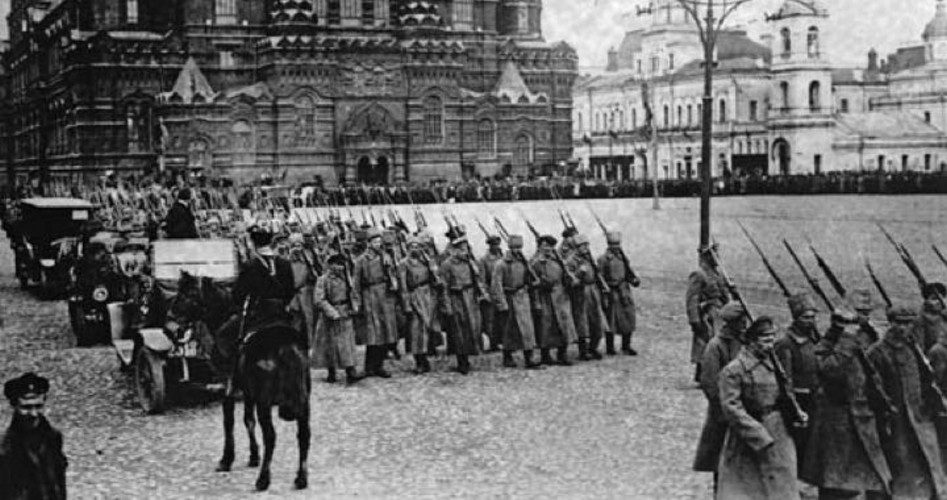
Today marks the 100th anniversary of the Bolshevik Revolution, which fastened communism upon Russia, turning it into the Soviet Union. The results of this revolution have drenched the world in blood for the past century.
As the late University of Hawaii historian Rudolph Rummel once stated, “In practice, Marxism has meant bloody terrorism, deadly purges, lethal prison camps and murderous forced labor, fatal deportations, man-made famines, extrajudicial executions and fraudulent show trials, outright mass murder and genocide.” Citing the examples of tyrannical communist dictators such as Joseph Stalin, Pol Pot, and Mao Tse-tung, Steven Rosefielde wrote in his book Red Holocaust that at least 60 million people were killed as a result of the implementation of communist regimes, charging they are “collectively guilty of holocaust-style felonious homicides.”
The person who has been blamed for most of the deaths in the Soviet Union was Stalin, who succeeded Vladimir Lenin as the ruling dictator of the world’s first openly communist nation. There was a good reason that Christians in Russia referred to Lenin as the “Antichrist.” But as historian Robert Gellately asserts, “Stalin initiated very little that Lenin had not already introduced or previewed.” Robert Conquest, author of The Great Terror: A Reassessment, called Stalin’s murderous regime the logical successor to the one first established by Lenin.
For one thing, Lenin died about seven years after the Bolshevik Revolution began, and he was in poor health for the last part of his reign. Stalin, on the other hand, ruled the USSR through terror for a generation. The exact number of deaths for which Stalin bears responsibility is unknown, but it is certainly in the millions — possibly as high as 60 million.
Alexander Solzhenitsyn — a former gulag prisoner, Russia historian, and author — told of a district party conference during Stalin’s dictatorship in which applause for Stalin went on for several minutes: “NKVD [forerunner of the KGB] men were standing in the hall applauding and watching to see who would quit [applauding] first!” After 11 minutes, “The director of the paper factory assumed a businesslike expression and sat down.… That same night the factory director was arrested.”
It was a typical day in Stalin’s Russia.
Once World War II began, the Russian communists murdered hundreds of thousands of eastern Europeans across countries such as Estonia, Latvia, Lithuania, Poland, Hungary, and others, eventually installing communist governments in power and blocking access to the West in what came to be known as the Iron Curtain. In the spring of 1940, the NKVD executed more than 20,000 Poles in the infamous Katyn Massacre after the Soviet Union invaded Poland in 1939. At the time, the Soviets placed the blame on the Germans, but as Conquest wrote, “It is nowhere believed any longer that the Germans were responsible.” Soviet repression of Poland is estimated to have caused the deaths of 150,000 Polish citizens during World War II.
When Czech patriot Jan Masaryck attempted to prevent the Soviet takeover of his country, the official story was that he “fell” out of a building to his death. We now know that he was pushed by KGB agents.
And, of course, hundreds, perhaps thousands, were killed attempting to escape from communist East Berlin into non-communist Berlin. The Berlin Wall, constructed in 1961, came down in 1989. No one was ever seen trying to sneak into the communist side.
In addition to the Soviet Union’s own murders, its red rulers inspired a policy of murder by other communist dictators. As John Stormer put it in None Dare Call It Treason: 25 Years Later, “The terror has been repeated wherever the Communists are working to take power.”
In South Africa, “the Communist-controlled African National Congress liberation front used the ‘necklacing’ technique for terror,” Stormer wrote. “Blacks who were accused of cooperating” with the government would be seized, “a rubber tire filled with gasoline or other flammable liquid would be placed around their neck and set afire.” It took 20 to 30 minutes for the victim to die.
In Vietnam, communists arrested seven children for attending a religion class. A wooden chopstick was rammed into each ear. “He jammed it with full force,” Stormer noted. “The stick split the ear canal wide open and tore the ear drum. The shrieking of the children was heard all over the village.” This was to set an example that they were not to listen to “propaganda” promoting the religion of Jesus Christ.
The violence first used by the Bolsheviks was not an aberration of its ideology. Rather it is the norm. State terror is a method used, as a matter of course, to install communist regimes and keep them in power. If anyone can top Stalin in the sheer numbers of human beings murdered to advance the cause of communism, it was China’s Mao. Historian Frank Dikotter has estimated that the death toll under Mao was “at least 45 million.”
Perhaps the record in percentage numbers was the systematic mass murders ordered by Pol Pot and his communist Khmer Rouge in Cambodia. It is estimated that the policies of Khmer Rouge led to the deaths of more than two million out of a population of only seven million.
In the face of this damning history comes Colin Kaepernick, who has led scores of National Football League players to “take a knee” during the playing of the National Anthem before NFL games. Kaepernick, who wears socks calling police officers pigs, has publicly praised the late Cuban dictator Fidel Castro. Castro came to power in Cuba in 1959, and used the same communist technique of murdering and terrorizing the population to accept communist dictatorship. Rummel estimates that Castro’s death toll is somewhere between 35,000 and 141,000.
From the first communist dictator of the Soviet Union, murder was a common practice. Lenin said, “Terror is a form of military operation that may be usefully applied.”
It is impossible to determine exactly how many human beings were systematically murdered to advance the communist cause. But we can safely state it was in the millions. Sadly, the bloody terror that began on November 7, 1917, is still not over. The Godless, evil ideology implemented by the Bolsheviks a century ago is still claiming fresh victims today.




